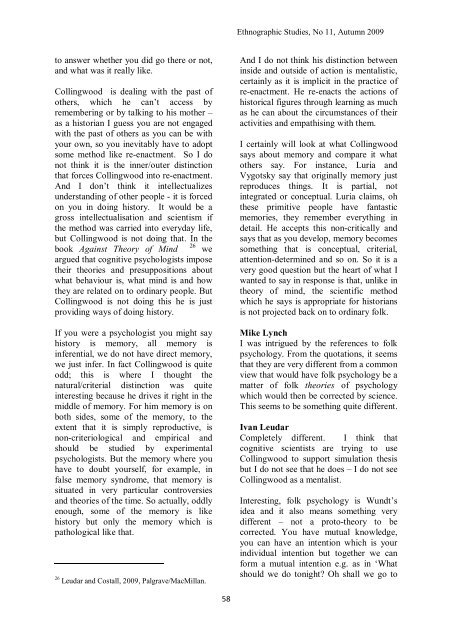What can R.G. Collingwood do for psychology today?
What can R.G. Collingwood do for psychology today?
What can R.G. Collingwood do for psychology today?
Create successful ePaper yourself
Turn your PDF publications into a flip-book with our unique Google optimized e-Paper software.
Ethnographic Studies, No 11, Autumn 2009<br />
to answer whether you did go there or not,<br />
and what was it really like.<br />
<strong>Collingwood</strong> is dealing with the past of<br />
others, which he <strong>can</strong>’t access by<br />
remembering or by talking to his mother –<br />
as a historian I guess you are not engaged<br />
with the past of others as you <strong>can</strong> be with<br />
your own, so you inevitably have to a<strong>do</strong>pt<br />
some method like re-enactment. So I <strong>do</strong><br />
not think it is the inner/outer distinction<br />
that <strong>for</strong>ces <strong>Collingwood</strong> into re-enactment.<br />
And I <strong>do</strong>n’t think it intellectualizes<br />
understanding of other people - it is <strong>for</strong>ced<br />
on you in <strong>do</strong>ing history. It would be a<br />
gross intellectualisation and scientism if<br />
the method was carried into everyday life,<br />
but <strong>Collingwood</strong> is not <strong>do</strong>ing that. In the<br />
26<br />
book Against Theory of Mind we<br />
argued that cognitive psychologists impose<br />
their theories and presuppositions about<br />
what behaviour is, what mind is and how<br />
they are related on to ordinary people. But<br />
<strong>Collingwood</strong> is not <strong>do</strong>ing this he is just<br />
providing ways of <strong>do</strong>ing history.<br />
If you were a psychologist you might say<br />
history is memory, all memory is<br />
inferential, we <strong>do</strong> not have direct memory,<br />
we just infer. In fact <strong>Collingwood</strong> is quite<br />
odd; this is where I thought the<br />
natural/criterial distinction was quite<br />
interesting because he drives it right in the<br />
middle of memory. For him memory is on<br />
both sides, some of the memory, to the<br />
extent that it is simply reproductive, is<br />
non-criteriological and empirical and<br />
should be studied by experimental<br />
psychologists. But the memory where you<br />
have to <strong>do</strong>ubt yourself, <strong>for</strong> example, in<br />
false memory syndrome, that memory is<br />
situated in very particular controversies<br />
and theories of the time. So actually, oddly<br />
enough, some of the memory is like<br />
history but only the memory which is<br />
pathological like that.<br />
<br />
26 Leudar and Costall, 2009, Palgrave/MacMillan.<br />
And I <strong>do</strong> not think his distinction between<br />
inside and outside of action is mentalistic,<br />
certainly as it is implicit in the practice of<br />
re-enactment. He re-enacts the actions of<br />
historical figures through learning as much<br />
as he <strong>can</strong> about the circumstances of their<br />
activities and empathising with them.<br />
I certainly will look at what <strong>Collingwood</strong><br />
says about memory and compare it what<br />
others say. For instance, Luria and<br />
Vygotsky say that originally memory just<br />
reproduces things. It is partial, not<br />
integrated or conceptual. Luria claims, oh<br />
these primitive people have fantastic<br />
memories, they remember everything in<br />
detail. He accepts this non-critically and<br />
says that as you develop, memory becomes<br />
something that is conceptual, criterial,<br />
attention-determined and so on. So it is a<br />
very good question but the heart of what I<br />
wanted to say in response is that, unlike in<br />
theory of mind, the scientific method<br />
which he says is appropriate <strong>for</strong> historians<br />
is not projected back on to ordinary folk.<br />
Mike Lynch<br />
I was intrigued by the references to folk<br />
<strong>psychology</strong>. From the quotations, it seems<br />
that they are very different from a common<br />
view that would have folk <strong>psychology</strong> be a<br />
matter of folk theories of <strong>psychology</strong><br />
which would then be corrected by science.<br />
This seems to be something quite different.<br />
Ivan Leudar<br />
Completely different. I think that<br />
cognitive scientists are trying to use<br />
<strong>Collingwood</strong> to support simulation thesis<br />
but I <strong>do</strong> not see that he <strong>do</strong>es – I <strong>do</strong> not see<br />
<strong>Collingwood</strong> as a mentalist.<br />
Interesting, folk <strong>psychology</strong> is Wundt’s<br />
idea and it also means something very<br />
different – not a proto-theory to be<br />
corrected. You have mutual knowledge,<br />
you <strong>can</strong> have an intention which is your<br />
individual intention but together we <strong>can</strong><br />
<strong>for</strong>m a mutual intention e.g. as in ‘<strong>What</strong><br />
should we <strong>do</strong> tonight? Oh shall we go to


